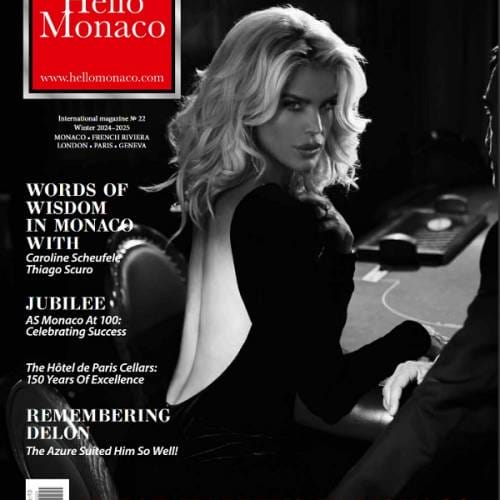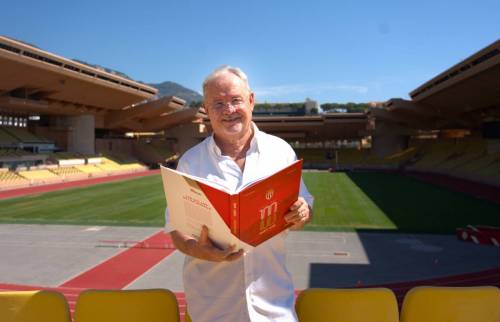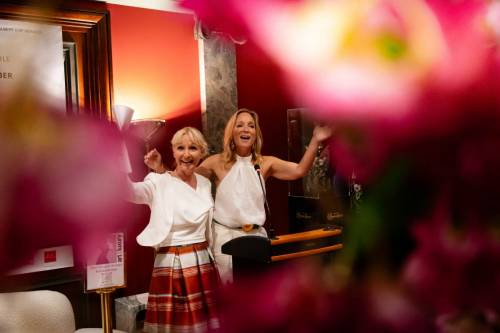H.E. Giulio Alaimo has recently been appointed Ambassador of Italy to the Principality of Monaco as a result of a brilliant diplomatic career started in March 1991 when he was named a “Diplomat Volunteer” after passing the State examination in Rome. Successfully completing the vocational training and serving the Directorate-General for Economic Affairs and the Prime Minister’s Office in Rome over a period of time, he held his first mission as First Commercial Secretary at the Italian Embassy in Islamabad (Pakistan). From 1998 until 2002, he acted as Consul General and Legation Councillor in La Plata (Argentina). In 2005, he was designated Counsellor for Emigration and Social Affairs at the Embassy in Ottawa (Canada) and later, in 2007, he was assigned the post of First Counsellor for Emigration and Social Affairs in the same Embassy. In 2009, he played the role as First Counsellor for Emigration and Social Affairs at the Italian Embassy in Paris (France).
In 2013, the Italian President awarded him the prestigious acknowledgment of Official Knight of the Order of Merit of the Republic. In 2015, he served as Deputy Commissioner General of the Italian Government for the 2015 Milan Expo. In 2016, after being appointed Minister Plenipotentiary, he was assigned to the Consulate General of Italy in Zurich (Switzerland). Married with three children, he has been representing Italy in the Principality since his designation on the 13th July 2020 followed by the Investiture Ceremony in the presence of the Sovereign Prince on the 16th September 2020.
HelloMonaco: Mr. Ambassador, how did you feel on the occasion of your official appointment?
Giulio Alaimo: Meeting H.S.H. Prince Albert II of Monaco for the first time was a meaningful and unforgettable experience for me. The Sovereign Prince belongs to a family that has reigned for many centuries in Monaco and this aroused a lot of emotion in me. Moreover, the long-lasting Monegasque heritage and tradition best represents the strong ties that bind Italy and the Principality. The Grimaldi Family, in fact, finds its roots in Genoa.
HM: Has your impression of the Principality changed compared to before?
GA: I have always considered Monaco extremely bright and vital. I do believe that the geographical dimension of the Principality is inversely proportional to its importance. Two square kilometres of territory versus huge international visibility that characterizes everything that happens here. Since I came here, I have had confirmation of my original impressions, despite the restrictions imposed by the health emergency.

HM: How did you get on with social distancing?
GA: The beginning of my mission in Monaco coincided with a very difficult period, following this terrible pandemic that has affected the whole world, drastically influencing our personal and professional life. The Covid-19 crisis limited my mission and most of the cultural and promotional initiatives open to the public that we were used to programming.
HM: What are your plans to enhance the excellence largely represented in Monaco by top-ranked Italian entrepreneurship?
GA: Italy is very well represented in the Principality. From a demographic point of view, Italy is the third community in terms of attendance with about 8,300 of Monaco’s residents having Italian descent. But also the entrepreneurial presence is relevant. According to our data, there are about 1,600 companies directly or indirectly related to Italians, not to mention about 4,500 commuters who are visiting Monaco daily, coming from the Liguria Region, the so called ‘frontalieri’. They represent an important axis in the implementation of several productive fields in Monaco like tourism as well as the service and catering sector. My mission is to strengthen the professional Italian spirit in the Principality by including further fields of expertise in which the government is investing a lot. Notably in the field of ecological and energy transition we are trying to create new opportunities of bilateral cooperation.
HM: On the 10th May 2021, an important bilateral agreement between Andrea Orlando, Italian Minister for Labour and Social Policy, and Pierre Dartout, Monaco’s Minister of State was held by the will of Monaco’s Government. What is that about and what will change for the Italian community?
GA: This agreement concludes a bilateral negotiation process which has lasted for a while and it was finalized with my arrival. So far, remote work has been proposed to Italian employees by way of exemptions (“derogation”) from previous agreements. The new deal amends the 1982 Social Security Agreement allowing people to do their job from home on the basis of a legal regulation. The document is not yet in force since it needs ratification by the Italian Parliament whose available approval times cannot be pinned down right now. Once adopted, any Italian citizen will be able to work for a Monegasque company in front of the computer from the comfort of their homes.
HM: You have been living in Monaco for about a year, what do you appreciate most? Why?
GA: The place is charming with an extremely privileged climate by the blue sea. On the cultural front, I can say that Italians feel at home in Monaco, whether you are a resident, a commuter or an institutional member. In the Principality, in fact, we are not considered as strangers but part of the local community. A deep bond of friendship towards Italy is clear and this makes me feel very pleased.
HM: Once the health emergency is over, what will you do first?
GA: It is hard to find just one goal. I think I will start making up for lost time. In this period, we have been limited in our activity but also in basic social relations. I would therefore like to resume the habit of meeting the community via a series of events supported by the Italian Embassy and myself. My first public appearance was at the Monte-Carlo Comedy Film Festival by Ezio Greggio, in October 2020, and my second one was in the June-2021 edition of the same event. Even the traditional Italian Republic Celebration Gala (2nd June 2021) was cancelled and celebrated on remote platforms only. Coming back to a regular set of rendezvous with Italians in Monaco is on my agenda besides keeping up the excellent relations with local authorities. Thus, we are already planning to pay tribute to the great Italian poet, Dante Alighieri, on the 700th anniversary of his death as part of Italian Language Week in the World.
HM: What values do you consider most important in playing the role of a diplomat?
GA: My mission implies a lot of personal sacrifices. A diplomatic career is commonly seen as something absolutely outstanding and brilliant. The implications on a personal and family level are less perceived.
Our children are able to stay with the family as far as a certain age and then they must follow their path, not because they choose this but because they are obliged to, considering that the quality of schooling is not high in all places. In my case our kids live in Milan, not at a very far distance, but that still loosens the family relationship. The spouse, man or woman, is unlikely to be able to carry on their own professional activity because we are compelled to change country every four years. Unless you are a free thinker, a writer or a painter, continuity in your professional activity is difficult.
My effort during these thirty years of my diplomatic career has been that of reconciling professional life with the personal dimension. So far it has been possible but it is not a painless operation because you still live far from your beloved ones and from your roots and this has a psychological cost which can be heavy to handle at certain times.

HM: In your opinion, what does it mean to be a successful person?
GA: Not an easy question to answer. Success perhaps lies in having found the right balance between your professional and your private life as well as being able to always manage quietly what we have to face at any given moment, without second thoughts.
I believe that success is measured not so much by our professional affirmation in the strict sense but rather with serenity in facing your own life.
HM: You are father of three children; what legacy would you like to leave them or would you like them to acquire?
GA: My wife and I have always tried to give examples more than just with words, but rather with our behaviour.
Commitment, seriousness and consistency both for ourselves and with others; these are the aspects on which we have focused the most. We think we have achieved the result and we are proud of it, raising three wise and polite children, respectful of others and very sensitive to environmental issues.
I believe that through the respect of the environment our future is best safeguarded.
HM: If you would have the chance to speak to a historical figure from the past, who would you like to meet? Why?
GA: I am very fond of history by my academic training. I could therefore make a long list of characters from the past that have marked the fate of the world for better or for worse.
Historians make the case that a political personality is important because he acted very well or because he acted very badly. Also the negative characters of the last hundred years are figures that I would be very curious to meet. Indeed, perhaps they are the ones that intrigue me the most because they often hide complexities and problems in their psychology which could justify their actions in a certain sense. On the positive side, I would like to retrace the footsteps of the Italian Renaissance and meet some undisputed geniuses of that era such as for example Leonardo Da Vinci.
HM: What are the priorities of your diplomatic mission?
GA: In this past year conditioned by the pandemic situation, I was able to get a sense of the local realities and the opportunities for collaboration. We have excellent bilateral relations with the Principality of Monaco both within the international organizations to which we belong as well as excellent cross-border collaboration and relationships. The imminent inauguration of the Ventimiglia yacht port is a priority. It will become the third port of Monaco with the approval of the Société des Ports de Monaco which has invested heavily in the project.
Furthermore, I aim to consolidate the cross-border partnership with practical and timely projects and, more generally, to strengthen frequent high-level political-institutional collaboration; these are some of the main priorities that I particularly care about. In addition to these, my attention is focused on the developments, in the short to medium term, of the Monaco labour market. In this way, cross-border commuters can reshape their professional training to meet the future needs required in the Principality.
In this regard, we are building collaboration between the Central States and Italian Regions.
HM: Did you enjoy experiencing this interview?
GA: Absolutely yes. I found the interview pleasant and in line with the topics on which we are working and that most represent the Principality’s sensitivities. I believe that the relationship with the press and media is fundamental for an institutional public office abroad. Communication is essential and it needs quality editors to spread our goals.









